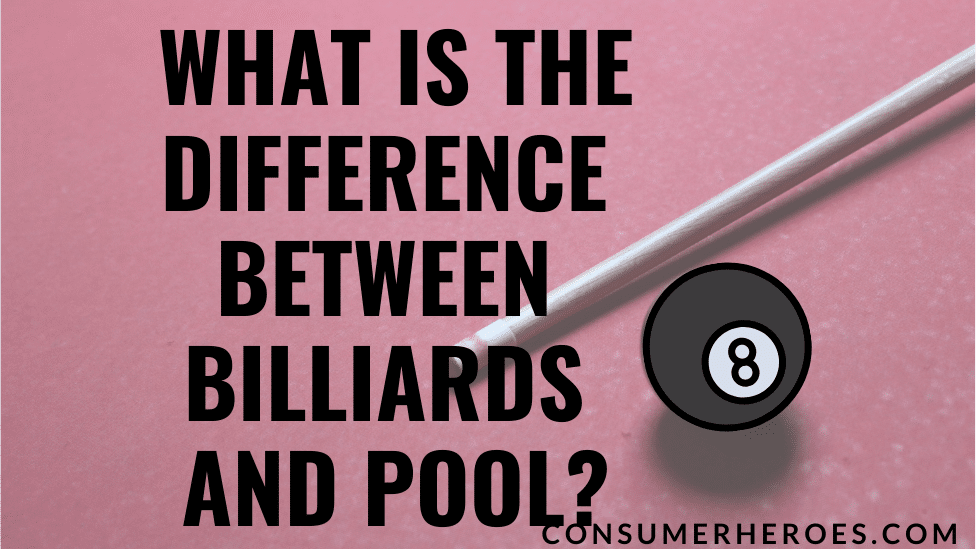Billiards and pool are often used interchangeably, but they are not the same game. Both games are played on a table with cues and balls, but they have different sets of rules and are played with different types of balls. Knowing the difference between the two games can help players choose which one to play and improve their skills.
Billiards is a game that is played with three balls: a white cue ball and two object balls. The object of the game is to score points by hitting one of the object balls with the cue ball and making it contact the other object ball. The game can be played with a variety of rules and variations, but the basic concept remains the same. Billiards is often considered a more challenging game than pool because of the smaller table size and the lack of pockets.
Pool, on the other hand, is played with 16 balls: one white cue ball, seven solid-colored balls, seven striped balls, and one black eight ball. The object of the game is to pocket all of the balls, either solids or stripes, and then pocket the eight ball. There are several variations of pool, including eight-ball, nine-ball, and straight pool. Pool is a popular recreational game that is played in bars, pool halls, and homes around the world.
Origins of Billiards and Pool
Billiards and pool are two games that are often used interchangeably, but they are actually two different games. They have different rules, equipment, and even histories. This article will explore the origins of billiards and pool.
History of Billiards
Billiards is a game that has been around for centuries. It is believed to have originated in Northern Europe in the 15th century. The game was originally played outdoors on a lawn with large balls and wooden mallets. It was later moved indoors and played on a table.
In the 19th century, billiards became a popular pastime for the wealthy. It was played in private clubs and was considered a sign of social status. The game was also used as a way to gamble, with large sums of money being wagered on games.
The equipment used in billiards has also evolved over time. The original balls were made of wood, but they were later replaced with ivory. Today, most billiards balls are made of a high-quality plastic.
History of Pool
Pool, on the other hand, is a relatively new game. It is believed to have originated in the United States in the late 19th century. The game was played on a table with six pockets, and it was called “pocket billiards.”
Pool quickly became a popular game in the United States, and it was played in pool halls all over the country. The game was also used as a way to gamble, with players betting on games.
The equipment used in pool is similar to that used in billiards, but there are some differences. Pool tables are smaller than billiards tables, and the balls used in pool are smaller and lighter than those used in billiards.
In conclusion, while billiards and pool are often used interchangeably, they are actually two different games with different histories and equipment. Billiards has been around for centuries and was originally played outdoors, while pool is a relatively new game that originated in the United States.
Gameplay Differences
Billiards Gameplay
Billiards is a cue sport that is played on a table with no pockets. The objective of the game is to score points by hitting the two balls on the table with the cue ball. The player who scores the most points at the end of the game wins.
In billiards, the balls are smaller and lighter than in pool. The table is also larger, with a playing surface of 5 feet by 10 feet. The balls are typically made of ivory or a synthetic material, and the cue sticks are longer and lighter than those used in pool.
The game begins with the balls set up in a specific formation, and the players take turns hitting the balls with the cue ball. The player must hit the correct ball first, and if they fail to do so, they lose their turn.
Pool Gameplay
Pool, on the other hand, is a cue sport that is played on a table with six pockets. The objective of the game is to sink all of the balls into the pockets, with the player who sinks the most balls winning the game.
In pool, the balls are larger and heavier than in billiards. The table is also smaller, with a playing surface of 4.5 feet by 9 feet. The balls are typically made of resin or polyester, and the cue sticks are shorter and heavier than those used in billiards.
The game begins with the balls set up in a triangle formation, with the 8-ball in the center. The players take turns hitting the balls with the cue ball, and must sink their designated balls (stripes or solids) before sinking the 8-ball to win the game.
Overall, the main difference between billiards and pool is the gameplay. Billiards is a game of skill and strategy, with no pockets and a focus on scoring points. Pool, on the other hand, is a game of precision and strategy, with six pockets and a focus on sinking balls.
Equipment Differences
Billiards Equipment
Billiards is typically played on a larger table than pool, with a standard size of 12 feet by 6 feet. The balls used in billiards are also larger and heavier than those used in pool. A set of billiard balls includes three balls of different colors – white, yellow, and red – and a cue ball, which is typically white.
Billiard cues are usually longer and heavier than pool cues, with a thicker shaft and a larger tip. They are designed to allow players to generate more power and spin on the ball. Billiards also requires a special type of chalk that is harder than the chalk used in pool. This helps to prevent miscues and ensures a more consistent shot.
Pool Equipment
Pool tables are smaller than billiard tables, with a standard size of 9 feet by 4.5 feet. The balls used in pool are smaller and lighter than those used in billiards, with a set of 15 balls that includes seven solid-colored balls, seven striped balls, and a black 8 ball.
Pool cues are shorter and lighter than billiard cues, with a thinner shaft and a smaller tip. They are designed to allow players to make more precise shots and control the ball with greater accuracy. Pool also requires a softer chalk that provides better grip and allows for more spin on the ball.
In conclusion, while both billiards and pool involve striking balls with a cue stick, there are significant differences in the equipment used. Billiards is played on a larger table with larger, heavier balls and cues, while pool is played on a smaller table with smaller, lighter balls and cues. Understanding these differences is essential for players looking to excel in either game.
Rules and Regulations
Billiards Rules
Billiards is a game that is played with three balls: one white, one yellow, and one red. The objective of the game is to score points by hitting the red ball with the white or yellow ball and making it go into one of the six pockets on the table. The player who scores the most points at the end of the game wins.
There are a few basic rules that players must follow when playing billiards. These include:
- The game begins with the white ball being placed on the table and the other two balls being placed in the “D” area at the other end of the table.
- The player must hit the white ball with the cue stick and make it touch one of the other balls.
- If the player hits the wrong ball or fails to hit any ball, it is considered a foul and the other player gets to take a turn.
- If the player pockets the red ball, they score one point. If they also hit one of the other balls into a pocket, they score an additional point.
- If the player pockets one of the other balls without hitting the red ball first, they do not score any points.
Pool Rules
Pool, also known as pocket billiards, is a game that is played with 16 balls: one cue ball and 15 object balls. The objective of the game is to score points by pocketing the object balls using the cue ball. The player who pockets the most balls at the end of the game wins.
There are several different variations of pool, each with their own set of rules. However, some basic rules that apply to most versions of the game include:
- The game begins with all 15 object balls being racked in a triangle shape at one end of the table, with the apex of the triangle pointing towards the foot of the table.
- The player must hit the cue ball with the cue stick and make it touch one of the object balls.
- If the player pockets an object ball, they must continue shooting until they miss or commit a foul.
- If the player commits a foul, the other player gets to take a turn. Common fouls include hitting the wrong ball, failing to hit any ball, or scratching (i.e. pocketing the cue ball).
Overall, while billiards and pool have some similarities in terms of gameplay, they have distinct differences in terms of the number of balls used, the objective of the game, and the specific rules that apply.
Popularity and Influence
Billiards Popularity
Billiards is a lesser-known game compared to pool. It is mostly played by serious players who are interested in the technical aspects of the game. Billiards is often played in a quiet and formal environment, such as a billiards hall or a private club. The game is usually played on a larger table with no pockets, and the objective is to score points by hitting the balls with a cue ball. Billiards is more of a precision game, and players need to have a good understanding of the physics of the game to excel.
Pool Popularity
Pool, on the other hand, is a much more popular game than billiards. It is played in a more casual setting, such as bars, clubs, and homes. Pool is usually played on a smaller table with pockets, and the objective is to pocket the balls in a specific order. Pool is a more relaxed game, and players can enjoy it without being too serious. The game has different variations, such as eight-ball, nine-ball, and straight pool, which adds to its popularity.
Overall, pool has a larger following than billiards, and it has had a significant influence on popular culture. It has been featured in movies, TV shows, and video games, which has helped to increase its popularity. Billiards, on the other hand, has remained a niche game, played mostly by serious players who appreciate the technical aspects of the game.
Conclusion
In conclusion, while billiards and pool share many similarities, they are two distinct games with their own unique rules and gameplay.
Billiards is a more traditional game, played on a larger table with no pockets and a focus on strategy and precision. It requires a great deal of skill and practice to master, making it a popular choice among serious players.
On the other hand, pool is a more casual game, played on a smaller table with pockets and a focus on speed and accuracy. It is a popular choice among beginners and social players, as it is easier to learn and more forgiving of mistakes.
Ultimately, the choice between billiards and pool comes down to personal preference and skill level. Both games offer their own unique challenges and rewards, and both have their own vibrant communities of players and enthusiasts.
Whether you prefer the classic elegance of billiards or the fast-paced excitement of pool, there is no denying that both games are a true test of skill and strategy. So why not try them both and see which one you prefer?







